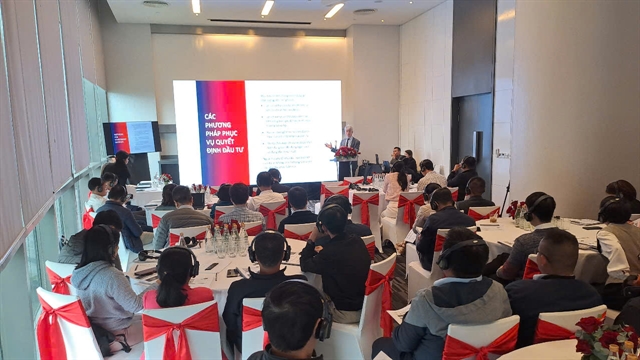 Society
Society

 |
| Participants join an introduction of the ‘Handbook for Evaluating Necessity and Socio-Economic Efficiency of Urban Transport Projects’ in Đà Nẵng City. VNS Photo Công Thành |
ĐÀ NẴNG — The central city, in co-operation with the World Bank, has introduced the ‘Handbook for Evaluating Necessity and Socio-Economic Efficiency of Urban Transport Projects’ after a two-year development with support from the WB and the Swiss State Secretariat for Economic Affairs (SECO).
The handbook will help provide tools, such as forms and estimated value parameters, to analyse the social benefits and costs of projects, while focusing on two key stages under the Law on Public Investment – the investment policy approval stage and the investment project approval stage, vice director of the city’s finance department, Đặng Đình Đức said.
By conducting detailed appraisals early on, the manual helps decision makers select necessary projects, avoid unnecessary investments and reduce waste of state resources, he said, adding that after the investment policy is approved, projects go through further assessments before implementation.
Đức said the Đà Nẵng City’s Public Financial Management Reforms project, which is the first partnership between SECO and the World Bank in support of public financial management reforms at the sub-national level in Việt Nam, has helped complete the report on Fiscal Strategy in 2026-30.
The assessment on the public investment projects will help select effective solutions, while making savings in the State budget, he said.
 |
| Rồng (Dragon) bridge in Đà Nẵng City is a public investment project with funding from the World Bank. The city and WB has been building a strong partnership and effective co-operation in key infrastructure projects over past decades. Photo courtesy of Lê Lâm |
The project provides advisory and capacity building support in four key areas of common interest—Fiscal Strategy, Medium-term Budgeting, Public Service Performance Reporting, and Public Debt Management—which were highlighted in the Public Expenditure and Financial Accountability (PEFA) assessment in Da Nang City. This support is expected to build a solid basis for broadening and deepening reforms and collaboration in the medium-term.
Simon Groom, a World Bank consultant, said the handbook is a methodology for investment policy decision.
It includes necessity and implementation of the project, or preliminary assessment of socio-economic efficiency, the most important items for the project success, assessment risks of climate change.
The handbook standardises the appraisal process, improving the quality of project evaluations as it gives management agencies, appraisal units and stakeholders a consistent and reliable tool to make better decisions about public investments.
Đà Nẵng is the first locality in Việt Nam to use international practices to appraise urban transport projects, and the city achieved this by using a manual developed by its Department of Finance.
The programme aims to improve how the city manages its budget, public finances and investments, focusing on key goals including strengthening budget planning and financial management, improving revenue and expenditure forecasting to ensure efficient and sustainable resource use, evaluating and optimising public investments to deliver high socio-economic value, building the appraisal skills of municipal officials and using strategies, data, and digital technology to improve analysis, asset management, and transparency in public financial management.
The WB has funded many key infrastructure projects in Đà Nẵng over the past two decades, most recently it gave a US$100 million investment to Đà Nẵng University to improve its infrastructure, increase financial support and enhance management capacity.
The two partners have been boosting cooperation in building digital database management as a crucial way towards full digitalisation and for Đà Nẵng becoming a fully ‘smart’ city.